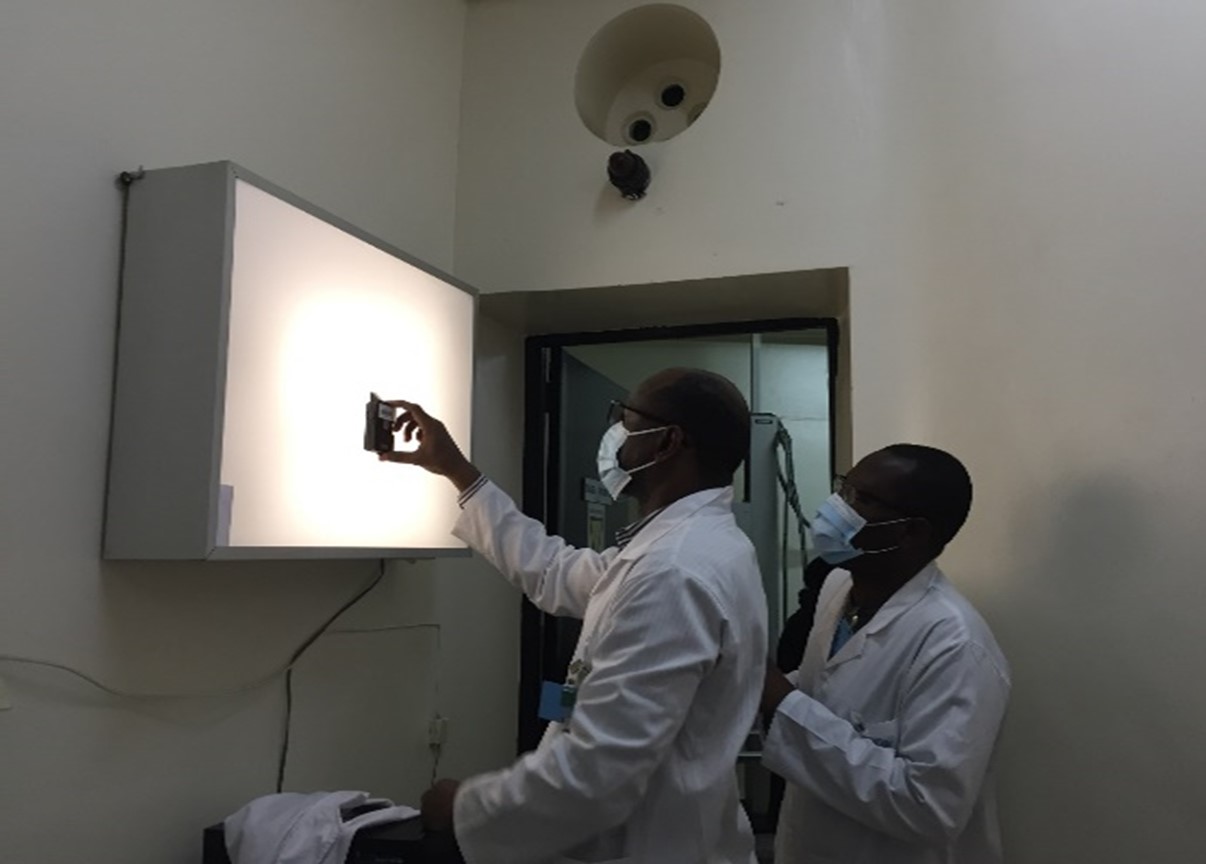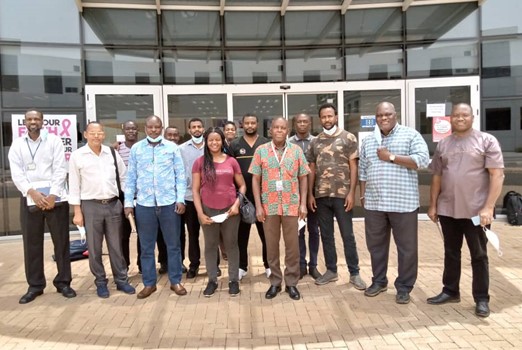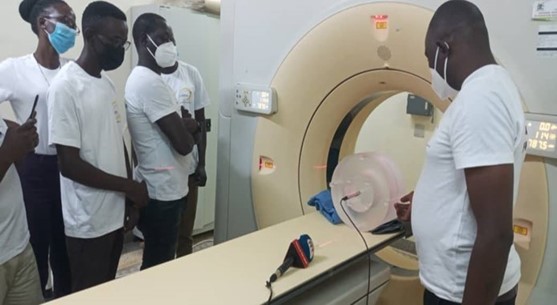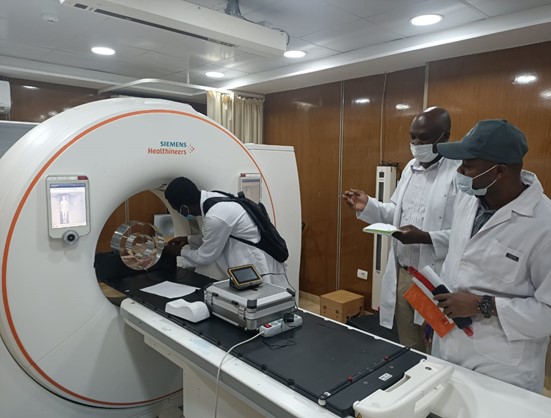 Training of Radiation Medicine Professionals
Enhancing access to quality cancer diagnosis, treatment and therapy in Africa through a skilled and competent workforce
Training of Radiation Medicine Professionals
Enhancing access to quality cancer diagnosis, treatment and therapy in Africa through a skilled and competent workforce

Challenges
Cancer rates are rising rapidly in Africa, a trend that is set to become more pronounced over time due to population growth and the aging of the continent’s population. Most African countries do not have the capacities to respond effectively to this crisis. One of the major challenges for addressing the cancer burden in the region has been a limited skilled health workforce in radiation medicine, in particular medical physicists.
A recent survey conducted by the International Atomic Energy Agency (IAEA) with the participation of 212 health centres in 21 African countries identified a significant lack of medical physicists in radiology and nuclear medicine. Only 26.8 percent of the 212 health centres surveyed are equipped with an adequate number of medical physicists. 11 countries do not have a single institution with sufficient medical physicists.
Towards a Solution
To address this challenge, IAEA is implementing a regional education and training initiative in radiation oncology, radiation therapy and medical physics to increase the number of competent and skilled radiation medicine professionals in Africa. The initiative is conducted in the framework of a series of technical cooperation projects and will strengthen Africa’s capacities for cancer diagnosis, treatment and therapy, thus supporting SDG 3.4 (non-communicable diseases) and SDG 8.8 (worker safety and protection).
The initiative simultaneously facilitates the provision of education and training responding to the specific needs of individual countries, and the development of national and regional education and training curricula in radiation medicine. A core curriculum for education and training in radiation, clinical oncology and radiotherapy was prepared at the beginning of the initiative that serves as a basic minimum requirement for training programmes and training institutes in Africa.
Selected training institutes in countries in Africa and outside of Africa are providing long-term and short-term academic and clinical training in radiation oncology, radiation therapy and medical physics. Candidates from participating countries that do not have training programmes available locally (Angola, Burkina Faso, Ethiopia, Libya, Madagascar, Mauritania, Namibia, Nigeria, Rwanda and Uganda) are accessing academic and clinical training in countries with well-established training programmes within and outside the continent (Brazil, Egypt, Ghana, Italy, Kenya, Morocco, Senegal and South Africa).
To date, 40 people have been trained, significantly boosting the human resource capacity in this field in Africa. 21 radiation medicine professionals have received or are currently attending long-term academic training: nine radiation oncologists have been placed in Brazil, Ghana, Senegal and South Africa; six radiation therapy technicians have been placed in Egypt, Ghana and Morocco; and six medical physicists are in Morocco and at the Abdus Salam International Centre for Theoretical Physics in Italy. Several fellows have already completed their training and have begun to apply their new skills in their home institutions. T19 medical physicists from Benin, Cote d’Ivoire, Ethiopia, Kenya, Libya, Mauritania, Niger, Sierra Leone, Sudan, Uganda, and Zimbabwe are fully trained.
Special emphasis has been placed on medical physics to enhance the overall safety and effectiveness of nuclear medicine and diagnostic radiology services in Africa through dose optimization and appropriate quality assurance programmes. A comprehensive and thorough assessment of the human and physical infrastructure in the region has resulted in the identification of three countries — Algeria (for French-speaking countries), Egypt (for Arabic speaking countries) and Ghana (for English speaking countries) — with the capacity to deliver quality long-term clinical training in radiology and nuclear medicine medical physics in line with the African Regional Cooperative Agreement for Research, Development and Training related to Nuclear Science and Technology (AFRA) harmonized syllabus in medical physics. This syllabus serves as a reference in the formulation of Member States’ long-term national clinical training programmes related to medical physics in radiotherapy, nuclear medicine and radiology.
Through this initiative, Africa has become the first region to develop a harmonized quality control programme based on IAEA guidance for effective implementation of quality assurance among institutions, which ensures the sustainability of the project. The harmonized protocol provides a practical guide for the execution of quality control (QC) tests for radiography, fluoroscopy, mammography, computed tomography and gamma camera SPECT systems and establishes a common basis for data collection and analysis, results and experience sharing. The participating countries have also been equipped with the necessary QC equipment and tools to build their capacities to implement the harmonized QC programme. The QC programme is already being implemented in imaging centres in eight African countries (Algeria, Egypt, Ethiopia, Ghana, Kenya, Senegal, Uganda and Zambia). Based on the results of the project, other regions are now considering the development of similar protocols.
Contact Information
Countries involved
Supported by
Implementing Entities
Project Status
Project Period
URL of the practice
Primary SDG
Primary SDG Targets
Secondary SDGs
Secondary SDG Targets
Similar Solutions
| NAME OF SOLUTION | Countries | SDG | Project Status | |
|---|---|---|---|---|
Accelerating the Implementation of African Union Treaties in São Tomé and Príncipe South-South learning from the Beninese judicial system’s experience in the application of human rights treaties to its national law |
Algeria, Angola, Benin, Brazil, Burkina Faso, Burundi, Cameroon, Congo, Côte D'Ivoire, Democratic Republic of the Congo, Egypt, Ethiopia, Gabon, Ghana, Italy, Kenya, Libya, Madagascar, Mali, Mauritania, Mauritius, Morocco, Mozambique, Namibia, Niger, Nigeria, Senegal, Sierra Leone, South Africa, Sudan, Tunisia, Uganda, United Republic of Tanzania, Zambia, Zimbabwe | 05 - Gender Equality | Completed | View Details |
Accelerating the Transformational Shift to a Low-Carbon Economy in Mauritius Towards supplying 35 percent of the country’s energy needs with renewables by 2025 |
Algeria, Angola, Benin, Brazil, Burkina Faso, Burundi, Cameroon, Congo, Côte D'Ivoire, Democratic Republic of the Congo, Egypt, Ethiopia, Gabon, Ghana, Italy, Kenya, Libya, Madagascar, Mali, Mauritania, Mauritius, Morocco, Mozambique, Namibia, Niger, Nigeria, Senegal, Sierra Leone, South Africa, Sudan, Tunisia, Uganda, United Republic of Tanzania, Zambia, Zimbabwe | 05 - Gender Equality 09 - Industry, Innovation and Infrastructure 13 - Climate Action | Ongoing | View Details |
Accelerator Labs Network Following collective intelligence methods to address emerging sustainability challenges and the growing demand for local solutions |
Algeria, Angola, Benin, Brazil, Burkina Faso, Burundi, Cameroon, Congo, Côte D'Ivoire, Democratic Republic of the Congo, Egypt, Ethiopia, Gabon, Ghana, Italy, Kenya, Libya, Madagascar, Mali, Mauritania, Mauritius, Morocco, Mozambique, Namibia, Niger, Nigeria, Senegal, Sierra Leone, South Africa, Sudan, Tunisia, Uganda, United Republic of Tanzania, Zambia, Zimbabwe | 08 - Decent Work and Economic Growth 13 - Climate Action | Ongoing | View Details |
Accessibility of Financial Services and the Private Sector in Africa Maximizing the impact of financial cooperation on economic development and industrialization in Africa |
Algeria, Angola, Benin, Brazil, Burkina Faso, Burundi, Cameroon, Congo, Côte D'Ivoire, Democratic Republic of the Congo, Egypt, Ethiopia, Gabon, Ghana, Italy, Kenya, Libya, Madagascar, Mali, Mauritania, Mauritius, Morocco, Mozambique, Namibia, Niger, Nigeria, Senegal, Sierra Leone, South Africa, Sudan, Tunisia, Uganda, United Republic of Tanzania, Zambia, Zimbabwe | 08 - Decent Work and Economic Growth | Completed | View Details |
Accessibility ToolKit Promoting accessibility as a cornerstone for inclusive digital development in Bangladesh. |
Algeria, Angola, Benin, Brazil, Burkina Faso, Burundi, Cameroon, Congo, Côte D'Ivoire, Democratic Republic of the Congo, Egypt, Ethiopia, Gabon, Ghana, Italy, Kenya, Libya, Madagascar, Mali, Mauritania, Mauritius, Morocco, Mozambique, Namibia, Niger, Nigeria, Senegal, Sierra Leone, South Africa, Sudan, Tunisia, Uganda, United Republic of Tanzania, Zambia, Zimbabwe | 08 - Decent Work and Economic Growth | Completed | View Details |



